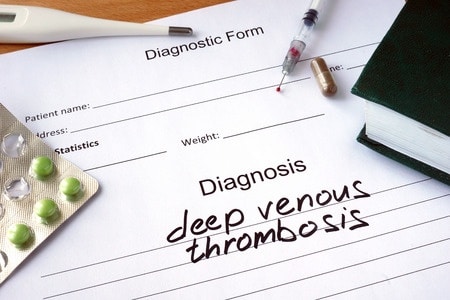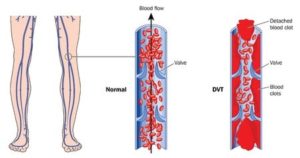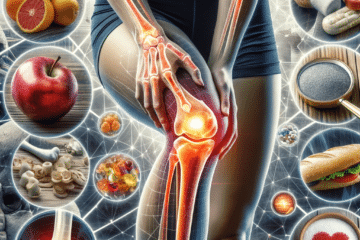
Blood clots in the leg (deep vein thrombosis or DVT) can form spontaneously, following trauma, long flights, or after surgery. If treated promptly most blood clots will resolve. In certain individuals the clot can move through the veins, into the heart and then the lungs where they cause a pulmonary embolus. Because of this risk of the blood clot in your leg moving to the lung it is important to obtain prompt treatment if a blood clot is suspected.
The symptoms of a blood clot (DVT) in the leg include:
- Leg swelling
- Calf pain
- Calf tenderness
Some of you will only have swelling and will not have calf pain. Others may not even notice the swelling before the signs of a pulmonary embolus present.
What Causes Blood Clots or DVT?

If the blood remains still in the veins, and more so if there was an injury, then a small clot can develop. The mechanism by which the clot forms and there is a cascade of events that enables this. This is where prevention and treatment strategies are targeted. That small clot can grow larger. If the clot in your leg occludes the vein, your leg will swell and your calf will usually be painful.
Risks Factors For Blood Clots:
- Family history -genetics can play a role
- Have a history of previous blood clots
- Recent Pelvic, Hip or Leg surgery
- Recent Hip or Knee Replacement surgery
- Travel
- Obesity
- Certain birth control medications
- If you have a cancer diagnosis
- Nearly 30% of blood clots in the leg occur in people with no known risk factors.
How Do You Diagnose a Blood Clot?
Blood clots in the leg are usually found with an ultrasound. If the clot has moved, then a CatScan might be necessary to find the clot in your pelvis, abdomen or lungs.
How Do I Prevent a Blood Clot?
Many blood clots can be prevented. Some can not. If you are on a long flight, get up, and move around. Strong consideration should be given to wearing compression socks. The socks should provide 20-30mmHg of graduated compression. An appropriate compression sock can be found here.
After surgery, many of you might be asked to take an anti-coagulant pill. They are effective in preventing clots in many people, but a risk is bleeding. Mechanical compression to keep the blood in your leg moving with a special pump can decrease the risk of developing blood clots in the leg. After surgery most all of you will have these. Home pumps are available and used for people who do not want to take, or can not take anti-coagulants. These pumps attach to a sleeve on the leg that fills up with air to forces the blood in your leg to keep moving through the veins. An example of a home pump for blood clot prevention can be found here.
Mobility is the key to preventing blood clots in most patients.
Blood clots in the leg are more common than you think. Prevention strategies are effective. Remaining mobile is key, if at all possible. When you are considering surgery talk to your doctor about any family or personal history of blood clots and your risk factors.
If you believe you may be suffering from a blood clot, you must act on it immediately. If your doctor does not return your call promptly, strong consideration should be given to going to an Emergency Room.
Howardluksmd.com provides the information and materials on this site for general information purposes only. You should not rely on the information provided as a substitute for actual professional medical advice, care, or treatment. This site is not designed to and does not provide medical advice, professional diagnosis, opinion, treatment, or services to you or any individual.
Affiliate links are used on this page. Discuss prevention strategies with your physician.















Thanks for getting the word out on awareness and prevention of blood clots. My mom died of blood clots while in the hospital for ulcer-related treatment. I really appreciate your blog.
My pleasure Carmen. Thank YOU for stopping by :-)
Thank you so much, great down to basic information, what we need right now. Thank you.